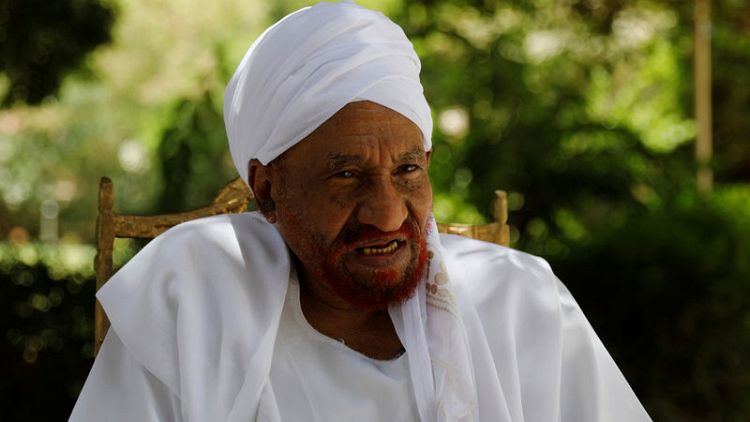By Michael Georgy and Khaled Abdelaziz
KHARTOUM (Reuters) - Sudan could face a counter coup if military rulers and the opposition do not reach agreement on a handover of power to civilians, leading opposition figure and former prime minister Sadiq al-Mahdi said on Thursday.
Mahdi, Sudan's last democratically elected premier, said hardliners in ousted president Omar Hassan al-Bashir's National Congress Party (NCP) and its allies in the army would try to exploit the uncertainty to seize power.
"For them to attempt a counter coup is most probable. All the time they are conspiring," Mahdi, 83, said in an interview with Reuters at his sprawling villa surrounded by gardens in the capital Khartoum.
"The whole group is well versed in conspiracy. The conspiratorial mind is ingrained in them."
Mahdi, who studied at Britain's Oxford University, was himself overthrown in a bloodless coup by Bashir in 1989.
Bashir fell after weeks of mass demonstrations and the Sudanese Professionals' Association, the main protest organiser, called for a million-strong march to take place later on Thursday to press for civilian rule.
Mahdi predicted that Sudan's generals would relinquish power if the current stalemate were broken.
"I think their intentions are good," he said of the senior army officers who overthrew Bashir on April 11, three decades after he himself seized power, and then formed the TMC.
"They are not interested in a military government," he said, an outcome which the African Union has said would be unacceptable.
The spokesman for Sudan's ruling Transitional Military Council (TMC) said later on Thursday it would retain "sovereign authority only" while civilians hold the post of prime minister and head all government ministries.
On Wednesday, the opposition and the TMC agreed to form a committee to resolve their disagreements, amid tensions over how long it would take to move to civilian government in Sudan, where widespread impoverishment has been entrenched by systemic financial mismanagement, corruption and cronyism.
SOME CONCESSIONS
The generals have offered some concessions, sacking some officials, announcing the arrest of others, including two of Bashir’s brothers, and ordering steps to curb fraud.
But they have insisted that, while they are willing to accept a civilian transitional government, ultimate authority will remain in their hands until elections are held up to two years from now.
Mahdi's moderate Islamic Umma party is engaged in the negotiations. Asked if he was interested in ruling Sudan now, Mahdi said: "I will not take part in government until and unless we have elections."
As two bodyguards stood by, he reflected on the turbulent history of Sudan under Bashir including multiple armed rebellions, economic crises and allegations of war crimes in Darfur, Mahdi recalled what he said was the day that the Islamist Bashir began leading Sudan to failure.
"I was praying at home. Dawn prayers. And they surrounded my house," he said of the 1989 coup which took him completely by surprise. "I think they wanted to kill me. To capture me and pretend I had tried to escape or resisted."
After Mahdi was initially jailed, he said he was taken to a what he described as a ghost house. Three men confronted him.
"You can save yourself if you record here that democracy has failed," he quoted them as saying. "They wanted me to give legitimacy to their coup."
He refused. "They took me back to an execution cell." For the next two years he was jailed and put under house arrest.
Mahdi said he had met with intelligence chief Salah Gosh and acting NCP chairman Ahmed Haroun on April 10, the day before Bashir was ousted, after they asked to see him.
The two men threatened to use force to disperse a protester sit-in outside the Defence Ministry, he said. Mahdi said he told them he would join the sit-in to help protect the protesters.
"At this point Haroun said, 'You will not find them because they will be crushed,'" said Mahdi.
Reuters could not independently verify this account. Gosh could not be reached for comment, while Haroun was arrested and jailed after Bashir's removal.
Bashir is now languishing in the same, high-security Kobar prison where he sent Mahdi 30 years ago, and where the veteran autocrat held thousands of political detainees. "Kobar is a collection of who's who in Sudanese politics," said Mahdi.
(Reporting by Michael Georgy and Khalid Abdelaziz; Editing by Mark Heinrich)
